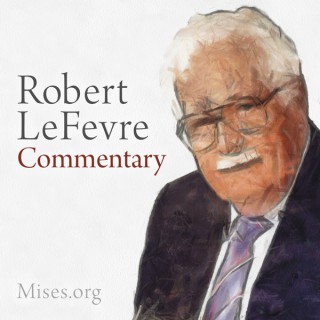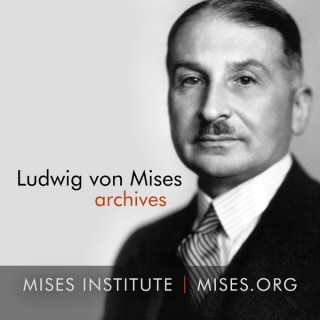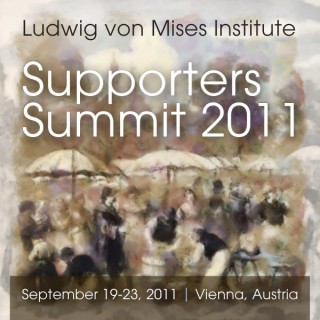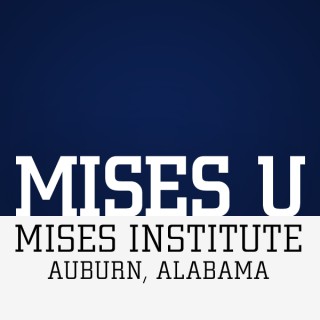Podcasts about austrian economics overview
- 68PODCASTS
- 1,211EPISODES
- 1h 2mAVG DURATION
- 1EPISODE EVERY OTHER WEEK
- Feb 17, 2026LATEST
POPULARITY
Best podcasts about austrian economics overview
Latest podcast episodes about austrian economics overview
Why Mises's The Theory of Money and Credit Is Still Important Today
Ludwig von Mises's first major work was The Theory of Money and Credit in which he explained the role of money in the economy and also pointed out what causes the boom-bust cycle. It remains an important classic in Austrian economics.Original article: https://mises.org/mises-wire/why-misess-theory-money-and-credit-still-important-today
Why Mises's The Theory of Money and Credit Is Still Important Today
Ludwig von Mises's first major work was The Theory of Money and Credit in which he explained the role of money in the economy and also pointed out what causes the boom-bust cycle. It remains an important classic in Austrian economics.Original article: https://mises.org/mises-wire/why-misess-theory-money-and-credit-still-important-today
Mark Thornton sits down with Ben Mumme of Living Your Greatness for a wide-ranging, long-form conversation, starting with gold and silver's run-up and sudden correction, zooming out to inflation, saving, and why Austrian economics matters for everyday life. Watch the original interview at https://livingyourgreatness.org/podcastOrder a Minor Issues tumbler today! https://mises.org/MinorIssuesTumblerBe sure to follow Minor Issues at https://Mises.org/MinorIssues
Today, the term "Austrian economics" is used to designate two very different paradigms.This essay was originally published in 1993 in the Review of Austrian Economics, Volume 6, Number 2.
On the latest episode of Minor Issues, Mark Thornton explains why the modern discussion of the division of labor is distorted by bad theory and political incentives. Mark contrasts Adam Smith's view with the Austrian tradition—especially Mises's—where the division of labor is driven and continuously reorganized by entrepreneurial judgment under uncertainty, disciplined by profit and loss. Mark also shows why technocrats and social engineers love an entrepreneur-less story of specialization, why Marxists found support in Smith's labor-theory drift, and why the real gains from specialization depend on individual differences that markets harmonize through exchange.Enter the 2026 Stocks vs. Manure Prediction Contest at https://mises.org/form/stocks-vs-manure-2026See “The Division of Labor Is at the Very Core of Economic Growth” by Per Bylund in The Next Generation of Austrian Economics: Essays in Honor of Joseph T. Salerno: https://mises.org/MI_160_AJoin us for the Mises Institute's first event of 2026, featuring Keith Smith, Caitlin Long, Ryan McMaken, Per Bylund, and Timothy Terrell: "Entrepreneurship Beyond Politics: Mises Circle in Oklahoma City." Register today at https://mises.org/okcOrder a Minor Issues tumbler today! https://mises.org/MinorIssuesTumblerBe sure to follow Minor Issues at https://Mises.org/MinorIssues
In the Company of Mavericks: Mark Thornton on the Austrian Comeback
On the latest episode of Minor Issues, Mark Thornton shares an in-depth interview with Jeremy McKeown of In the Company of Mavericks on the long rivalry between Austrian and Keynesian economics, and why Austrian ideas may be gaining new traction today. They trace how Austrian economics moved from a small academic outpost to a wider public audience, touching on the Mises Institute's role, the influence of figures like Roger Garrison and Ron Paul, and the ways online media and “alternative finance” have helped spread Austrian perspectives.We're entering the final week to enter the 2026 Stocks vs. Manure Prediction Contest at https://mises.org/form/stocks-vs-manure-2026Join us for the Mises Institute's first event of 2026, featuring Keith Smith, Caitlin Long, Ryan McMaken, Per Bylund, and Timothy Terrell: "Entrepreneurship Beyond Politics: Mises Circle in Oklahoma City." Register today at https://mises.org/okcOrder a Minor Issues tumbler today! https://mises.org/MinorIssuesTumblerBe sure to follow Minor Issues at https://Mises.org/MinorIssues
Austrian Economics: Your Ultimate Survival Toolkit for the Financial Reset
Connor O'Keeffe joins Rob Kientz on The Freedom Report for a wide-ranging conversation on Austrian economics, government power, and why today's affordability crisis is no accident. From inflation and interventionism to the failures of both political parties, Connor explains how decades of policy decisions have reshaped the economy, and why everyday Americans are paying the price. Connor and Rob also explore how real change actually happens, why crises accelerate power grabs, and what individuals can do to push back and build alternatives before the next shock hits.The original episode is available at https://youtu.be/5pl8sIOvTSA
Inflation isn't an economic metric—it's a political tactic. When governments lie about inflation, they're not miscalculating; they're stealing from you. Mises Fellow Karl-Friedrich Israel explains to Peter McCormack how inflation quietly enriches asset holders, punishes workers, and pushes Europe into a slow, silent decline.If your living standards are falling while politicians insist everything is fine, this conversation will make sense of it. If you still believe governments can print prosperity without consequences, you won't enjoy what follows.The original episode is available at https://www.petermccormack.com/episodes/133-karl-friedrich-israel-the-government-is-lying-about-inflation
Prompted by an online debate about whether economics belongs with the hard sciences, Bob reviews common defenses of mainstream practice and explains why they don't settle the scientific status of the field. He outlines the Mises–Rothbard view: economics as praxeology (logic of action), closer to geometry than laboratory testing, with core insights on opportunity cost, incentives, prices, money, and policy constraints that don't depend on forecasting the exact timing of crashes.Understanding Money Mechanics: Mises.org/HAP526aBob's Mises Daily Article, "Economists Can Be Hilarious": Mises.org/HAP526bHoppe's Economic Science and the Austrian Method: Mises.org/HAP526cLessons for the Young Economist: Mises.org/HAP526dThe Mises Institute is giving away 100,000 copies of Hayek for the 21st Century. Get your free copy at Mises.org/HAPodFree
Prompted by an online debate about whether economics belongs with the hard sciences, Bob reviews common defenses of mainstream practice and explains why they don't settle the scientific status of the field. He outlines the Mises–Rothbard view: economics as praxeology (logic of action), closer to geometry than laboratory testing, with core insights on opportunity cost, incentives, prices, money, and policy constraints that don't depend on forecasting the exact timing of crashes.Understanding Money Mechanics: Mises.org/HAP526aBob's Mises Daily Article, "Economists Can Be Hilarious": Mises.org/HAP526bHoppe's Economic Science and the Austrian Method: Mises.org/HAP526cLessons for the Young Economist: Mises.org/HAP526dThe Mises Institute is giving away 100,000 copies of Hayek for the 21st Century. Get your free copy at Mises.org/HAPodFree
Recipes with Rothbard: What Chocolate Cake Can Teach About Economics
When studying praxeology, something as trivial as the recipe for chocolate cake can become a way to better teach us Austrian economics.Original article: https://mises.org/mises-wire/recipes-rothbard-what-chocolate-cake-can-teach-about-economics
Recipes with Rothbard: What Chocolate Cake Can Teach About Economics
When studying praxeology, something as trivial as the recipe for chocolate cake can become a way to better teach us Austrian economics.Original article: https://mises.org/mises-wire/recipes-rothbard-what-chocolate-cake-can-teach-about-economics
Bob is joined by Dr. Peter Klein to take a look at the Mises Institute's new book, Hayek for the 21st Century. The discussion highlights Hayek's insights on tacit knowledge, why markets outperform central planners, the dangers of political power, and how monetary freedom could stop inflation. Along the way, Bob and Peter connect these timeless ideas to today's debates over technology, government control, and economic liberty. The Mises Institute is giving away 100,000 copies of Hayek for the 21st Century. Get your free copy at Mises.org/HAPodFree
Bob is joined by Dr. Peter Klein to take a look at the Mises Institute's new book, Hayek for the 21st Century. The discussion highlights Hayek's insights on tacit knowledge, why markets outperform central planners, the dangers of political power, and how monetary freedom could stop inflation. Along the way, Bob and Peter connect these timeless ideas to today's debates over technology, government control, and economic liberty. The Mises Institute is giving away 100,000 copies of Hayek for the 21st Century. Get your free copy at Mises.org/HAPodFree
Economist Joseph Salerno, an expert on the Austrian School, money, and methodology, joins us to talk about what makes the Austrian School of economics different. Be sure to follow Radio Rothbard at https://Mises.org/RadioRothbardRadio Rothbard mugs are available at the Mises Store. Get yours at https://Mises.org/RothMug PROMO CODE: RothPod for 20% off
Economist Joseph Salerno, an expert on the Austrian School, money, and methodology, joins us to talk about what makes the Austrian School of economics different. Be sure to follow Radio Rothbard at https://Mises.org/RadioRothbardRadio Rothbard mugs are available at the Mises Store. Get yours at https://Mises.org/RothMug PROMO CODE: RothPod for 20% off
Lucas Engelhardt explores the economics of interventionism, tracing Ludwig von Mises's core argument that state interference in markets is both self-defeating and inherently unstable. Building on insights from Rothbard, Ikeda, and Higgs, Engelhardt examines why interventionism persists despite its failures, and whether we are, in fact, on the road to socialism or stuck in a stable middle ground.Recorded at the Mises Institute in Auburn, Alabama, on July 25, 2025.Mises University is the world's leading instructional program in the Austrian School of economics, and is the essential training ground for economists who are looking beyond the mainstream.
Is economic inequality really the crisis it's made out to be, or is it a misunderstood feature of a healthy, free market society? Mark Thornton dismantles the modern obsession with equality, exposing the statist assumptions behind popular narratives and showing how capital accumulation, entrepreneurship, and individual differences drive prosperity. This is the Austrian answer to egalitarian myths.Recorded at the Mises Institute in Auburn, Alabama, on July 25, 2025.Mises University is the world's leading instructional program in the Austrian School of economics, and is the essential training ground for economists who are looking beyond the mainstream.
Tate Fegley analyzes the deep state through the lens of Austrian economics, showing how bureaucratic insulation, lack of economic calculation, and political incentives lead to cronyism and inefficiency. Focusing on defense procurement and media influence, he argues that systemic dysfunction—not bad actors—is the primary driver of deep state behavior.Recorded at the Mises Institute in Auburn, Alabama, on July 24, 2025.Mises University is the world's leading instructional program in the Austrian School of economics, and is the essential training ground for economists who are looking beyond the mainstream.
Tim Terrell offers a critical examination of higher education's economic structure, exploring how federal subsidies, credential inflation, and misaligned incentives have driven rising costs and declining academic rigor. Drawing on Austrian insights, he questions whether universities still serve their educational mission, or have become consumption-driven institutions shaped by bureaucratic interests and distorted signals.Recorded at the Mises Institute in Auburn, Alabama, on July 24, 2025.Mises University is the world's leading instructional program in the Austrian School of economics, and is the essential training ground for economists who are looking beyond the mainstream.
Lucas Engelhardt challenges conventional applications of game theory by integrating the Austrian perspective on entrepreneurship, showing how creative action can resolve apparent economic impasses like the prisoner's dilemma, the tragedy of the commons, and coordination failures.Recorded at the Mises Institute in Auburn, Alabama, on July 24, 2025.Mises University is the world's leading instructional program in the Austrian School of economics, and is the essential training ground for economists who are looking beyond the mainstream.
Paul Cwik and Shawn Ritenour revisit the often-overlooked "forgotten Austrians" who extended Mengerian economics beyond Vienna. From Wicksteed and Fetter to Strigl and Smart, this session highlights how the early Austrian tradition flourished across borders, until it was eclipsed by Walrasian formalism and Anglo-American Marshallianism.Recorded at the Mises Institute in Auburn, Alabama, on July 24, 2025.Mises University is the world's leading instructional program in the Austrian School of economics, and is the essential training ground for economists who are looking beyond the mainstream.
Shawn Ritenour critiques mainstream growth models that emphasize abstract inputs like capital accumulation and technological innovation, arguing instead for a human-centered approach rooted in Austrian economics. He emphasizes the foundational roles of entrepreneurship, time preference, the division of labor, and sound monetary institutions in fostering sustainable economic development.Recorded at the Mises Institute in Auburn, Alabama, on July 23, 2025.Mises University is the world's leading instructional program in the Austrian School of economics, and is the essential training ground for economists who are looking beyond the mainstream.
Sandra Klein takes on dwarf-tossing, horse meat, and human organ sales to show how moral squeamishness isn't a market failure, it's just a preference.Recorded at the Mises Institute in Auburn, Alabama, on July 23, 2025.Mises University is the world's leading instructional program in the Austrian School of economics, and is the essential training ground for economists who are looking beyond the mainstream.
Timothy Terrell tackles the most common objections to capitalism, from inequality myths to profit “villainy,” and offers a principled, empirical defense of market institutions and voluntary exchange.Recorded at the Mises Institute in Auburn, Alabama, on July 23, 2025.Mises University is the world's leading instructional program in the Austrian School of economics, and is the essential training ground for economists who are looking beyond the mainstream.
Inflation isn't just about rising prices. It's a systematic distortion of economic signals, fueling inequality, eroding social mobility, and undermining real growth.Recorded at the Mises Institute in Auburn, Alabama, on July 23, 2025.Mises University is the world's leading instructional program in the Austrian School of economics, and is the essential training ground for economists who are looking beyond the mainstream.
Tate Fegley examines how the structure of state-run police departments—lacking profit-and-loss mechanisms—leads to systemic inefficiencies, distorted incentives, and unaccountable authority within the public sector.Recorded at the Mises Institute in Auburn, Alabama, on July 23, 2025.Mises University is the world's leading instructional program in the Austrian School of economics, and is the essential training ground for economists who are looking beyond the mainstream.
Rethinking Sociology with Mises: A New Austro-Libertarian Framework for Understanding Society
Is Austrian Economics compatible with modern sociology, which is presently dominated by collectivists? However, it is possible to apply praxeology to sociology analysis, and that is where one begins to approach this discipline in a manner that promotes liberty.Original article: https://mises.org/mises-wire/rethinking-sociology-mises-new-austro-libertarian-framework-understanding-society
Dr. Jeffrey Herbener explains how time preference shapes interest rates, production, and investment, making time central to economic coordination and prosperity.Recorded at the Mises Institute in Auburn, Alabama, on July 22, 2025.Mises University is the world's leading instructional program in the Austrian School of economics, and is the essential training ground for economists who are looking beyond the mainstream.
The minimum wage is harmful, racist, sexist, and completely unnecessary.Recorded at the Mises Institute in Auburn, Alabama, on July 22, 2025.Mises University is the world's leading instructional program in the Austrian School of economics, and is the essential training ground for economists who are looking beyond the mainstream.
Competition is a relentless, dynamic process of entrepreneurship and discovery. Tom DiLorenzo exposes how antitrust laws, rooted in flawed theories of monopoly and “perfect competition,” have served as government tools to punish success, stifle innovation, and prop up politically favored monopoliesRecorded at the Mises Institute in Auburn, Alabama, on July 22, 2025.Mises University is the world's leading instructional program in the Austrian School of economics, and is the essential training ground for economists who are looking beyond the mainstream.
Paul Cwik unpacks Austrian Business Cycle Theory, explaining how artificial credit expansion triggers unsustainable booms and inevitable busts. He walks through models of savings, investment, and the structure of production to reveal how interest rate manipulation distorts the economy, and why liquidation and recovery are both necessary and painful.Recorded at the Mises Institute in Auburn, Alabama, on July 22, 2025.Mises University is the world's leading instructional program in the Austrian School of economics, and is the essential training ground for economists who are looking beyond the mainstream.
Rethinking Sociology with Mises: A New Austro-Libertarian Framework for Understanding Society
Is Austrian Economics compatible with modern sociology, which is presently dominated by collectivists? However, it is possible to apply praxeology to sociology analysis, and that is where one begins to approach this discipline in a manner that promotes liberty.Original article: https://mises.org/mises-wire/rethinking-sociology-mises-new-austro-libertarian-framework-understanding-society
Patrick Newman introduces Austrian capital theory: how savings, time, and production structures drive economic growth. Without capital goods and roundabout production, we'd still be living like primitive hunters, and without savings, growth halts altogether.Recorded at the Mises Institute in Auburn, Alabama, on July 22, 2025.Mises University is the world's leading instructional program in the Austrian School of economics, and is the essential training ground for economists who are looking beyond the mainstream.
A modern socialist economy is impossible.Recorded at the Mises Institute in Auburn, Alabama, on July 22, 2025.Mises University is the world's leading instructional program in the Austrian School of economics, and is the essential training ground for economists who are looking beyond the mainstream.
"The word praxeology can be used in two different ways. One is for a science of human action, as developed by Ludwig von Mises and his successors, principally Murray Rothbard. And the other is for the deductive method used in the science of human action."Recorded at the Mises Institute in Auburn, Alabama, on July 21, 2025.Mises University is the world's leading instructional program in the Austrian School of economics, and is the essential training ground for economists who are looking beyond the mainstream.
Jeffrey Herbener explains how Austrian price theory reveals the logic of voluntary exchange and subjective value, and why market prices emerge not from production costs, but from personal preferences and economizing choices.Recorded at the Mises Institute in Auburn, Alabama, on July 21, 2025.Mises University is the world's leading instructional program in the Austrian School of economics, and is the essential training ground for economists who are looking beyond the mainstream.
Dr. Sandy Klein walks through the origins and essential functions of money, showing how barter's pitfalls led to the spontaneous emergence of money as a medium of exchange. She explains Menger's and Mises's insights into money's evolution, why gold and silver prevailed, and how inflation and counterfeiting distort economies.Recorded at the Mises Institute in Auburn, Alabama, on July 21, 2025.Mises University is the world's leading instructional program in the Austrian School of economics, and is the essential training ground for economists who are looking beyond the mainstream.
David Howden reveals how banking, especially fractional reserves and central bank manipulations, creates instability and inflation. He also explains why a 100% reserve system could prevent crises, and why no one on Wall Street wants that to happen.Recorded at the Mises Institute in Auburn, Alabama, on July 21, 2025.Mises University is the world's leading instructional program in the Austrian School of economics, and is the essential training ground for economists who are looking beyond the mainstream.
Jesús Huerta de Soto has published a series of lectures on Austrian Economics, and Dr. David Gordon in Friday Philosophy reviews his Lectures in Austrian Economics, Volume 1. Dr. Gordon is especially interested in how de Soto deals with time.Original article: https://mises.org/friday-philosophy/invasion-spatializers
Jesús Huerta de Soto has published a series of lectures on Austrian Economics, and Dr. David Gordon in Friday Philosophy reviews his Lectures in Austrian Economics, Volume 1. Dr. Gordon is especially interested in how de Soto deals with time.Original article: https://mises.org/friday-philosophy/invasion-spatializers
Mises University begins Sunday, July 20, and given that misinformation abounds about the economy, it is good to have a forum where students can learn economic truths and stretch their minds.Original article: https://mises.org/mises-wire/why-mises-university-matters
Mises University begins Sunday, July 20, and given that misinformation abounds about the economy, it is good to have a forum where students can learn economic truths and stretch their minds.Original article: https://mises.org/mises-wire/why-mises-university-matters
Essays in Austrian Economics: Honoring Joe Salerno
This week, Bob talks with economist and Mises Institute research fellow, David Howden, co-editor of The Next Generation of Austrian Economics: Essays in Honor of Joe Salerno. They discuss key chapters from the book, highlighting significant contributions from up-and-coming Austrian economists in areas such as monopoly pricing, international economics, and monetary theory. The Next Generation of Austrian Economics: Essays in Honor of Joseph T. Salerno: Mises.org/HAP507aDavid Gordon's Review of the Book in The Austrian: Mises.org/HAP507bThe Mises Institute is giving away 100,000 copies of Murray Rothbard's, What Has Government Done to Our Money? Get your free copy at Mises.org/HAPodFree
This week, Bob talks with economist and Mises Institute research fellow, David Howden, co-editor of The Next Generation of Austrian Economics: Essays in Honor of Joe Salerno. They discuss key chapters from the book, highlighting significant contributions from up-and-coming Austrian economists in areas such as monopoly pricing, international economics, and monetary theory. The Next Generation of Austrian Economics: Essays in Honor of Joseph T. Salerno: Mises.org/HAP507aDavid Gordon's Review of the Book in The Austrian: Mises.org/HAP507bThe Mises Institute is giving away 100,000 copies of Murray Rothbard's, What Has Government Done to Our Money? Get your free copy at Mises.org/HAPodFree
The Young Rothbard: An Uncomfortable Neoclassical Economist
Speaking at the recent Rothbard Graduate Seminar, Dr. Joseph Salerno traces Murray Rothbard‘s intellectual development while in the economics Ph.D. program at Columbia University. Rothbard was dissatisfied with the popular schools of thought until he discovered Austrian economics.Original article: https://mises.org/mises-wire/young-rothbard-uncomfortable-neoclassical-economist
Speaking at the recent Rothbard Graduate Seminar, Dr. Joseph Salerno traces Murray Rothbard‘s intellectual development while in the economics Ph.D. program at Columbia University. Rothbard was dissatisfied with the popular schools of thought until he discovered Austrian economics.Original article: https://mises.org/mises-wire/young-rothbard-uncomfortable-neoclassical-economist
The Purpose of Production and the Economy: A Criticism of Pronatalist Economics
Mainstream economics is deterministic, holding that economic actors continue to move in one directions, not responding to changes in economic circumstances or incentives. The Austrians understand economics is about people engaged in purposeful action.Original article: https://mises.org/mises-wire/purpose-production-and-economy-criticism-pronatalist-economics
The Purpose of Production and the Economy: A Criticism of Pronatalist Economics
Mainstream economics is deterministic, holding that economic actors continue to move in one directions, not responding to changes in economic circumstances or incentives. The Austrians understand economics is about people engaged in purposeful action.Original article: https://mises.org/mises-wire/purpose-production-and-economy-criticism-pronatalist-economics
Dr. Jonathan Newman returns to the Human Action Podcast to discuss the relaunch of the Mises Academy—including his new course based on Bob's Lessons for the Young Economist textbook. But this conversation goes much deeper than curriculum. Bob and Jonathan unpack the fundamental question: What is economics, really? They explore how Austrian economics differs from psychology, history, and the natural sciences, why economics is more about understanding than prediction, and how praxeology reveals the logical structure of human choice.The New Mises Academy: Mises.org/HAP498aBob's Lessons for the Young Economist Textbook: Mises.org/HAP498bBob's Lessons for the Young Economist Teacher's Manual: Mises.org/HAP498cThe Mises Institute is giving away 100,000 copies of Murray Rothbard's, What Has Government Done to Our Money? Get your free copy at Mises.org/HAPodFree

























































